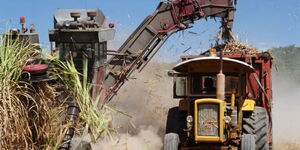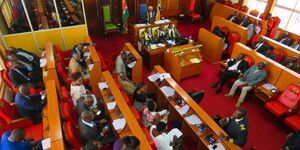United States President Donald Trump on Monday, April 7, fired a warning to Kenya over unfair trade practices.
Through the U.S. Department of Trade, Trump highlighted Kenya for imposing a 50 percent tariff on U.S. corn imports, as well as other regulatory requirements.
As per the Department, the move effectively blocked U.S. corn exports to Kenya despite the market's budding potential.
“Kenya imposes a 50 percent tariff on imports of U.S. corn, and imposes burdensome regulatory requirements, effectively blocking U.S. exports of corn,” the Department stated.
“Kenya's market for feed corn is currently estimated at $50 million (Ksh6.4 billion), with a potential to grow by 30% by 2027,” they further added.
To that effect, Trump warned of impending consequences for Kenya over its trade barriers.
In line with his “America First” policy, Trump signaled an impending retaliation in a bid to protect the American market from what he has termed as “exploitation of America.”
“Securing market access for American farmers will ensure they can compete on a level playing field,” he expressed.
The tariff imposed by Kenya applies to countries outside the East African Community (EAC) and the Common Market for Eastern and Southern Africa (COMESA), including the United States.
The move is aimed at shielding Kenyan farmers from international competition, ensuring they receive fair prices for their produce and promoting self-sufficiency in maize production.
Despite America's lamentations, the tariffs are part of existing EAC law on trade (Customs Union’s Common External Tariff (CET),and little can be done to change it. However, when deemed necessary, the Kenyan Government has temporarily waived agricultural tariffs to stabilize prices when domestic agricultural prices exceeded certain levels
Even so, the latest comes after Trump introduced a ten percent tariff on Kenyan exports through an executive order signed on Wednesday, April 2. Under the new tariffs signed by Trump, Kenya's Ksh109.7 billion (784 million USD) trade with the US is set to suffer a blow after a ten per cent baseline tariff on all of Kenya's exports.
The tariff will affect Kenyan exports, particularly in key sectors such as textiles, tea, and coffee, which have been exempt from tariffs under the African Growth and Opportunity Act (AGOA).
This, in turn, could lead to reduced exports, job losses, and lower revenues for businesses relying on the American market.
In response, Prime Cabinet Secretary Musalia Mudavadi acknowledged that Kenya will take a longer time to recover from the impact of policy shifts introduced by Trump's administration, such as the tariffs.
Speaking during the Inaugural Africa Exchange Meeting in Nairobi on Monday, April 7, Mudavadi maintained that the government of Kenya had to move with speed to address the sectors impacted by Trump's policies.












